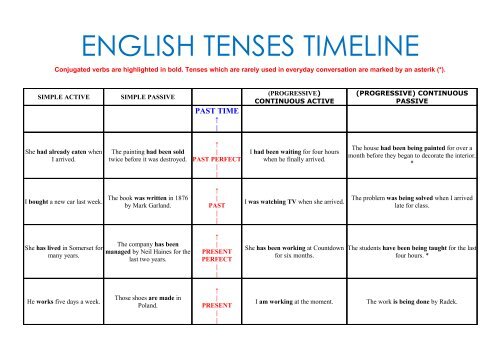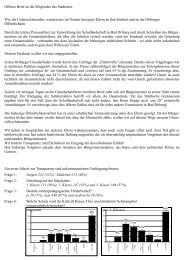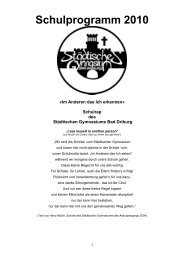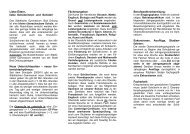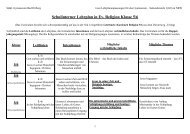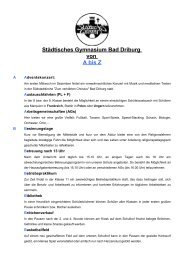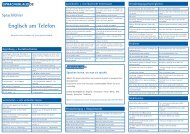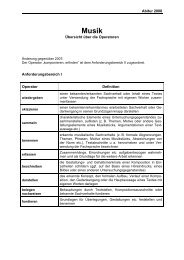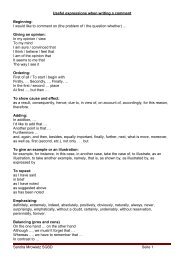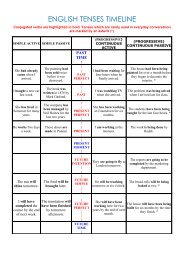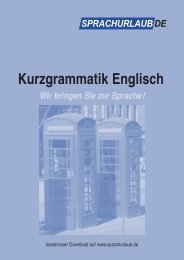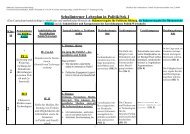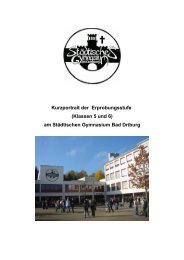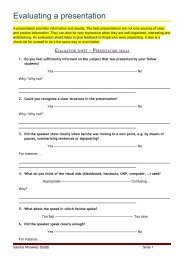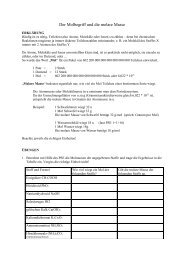ENGLISH TENSES TIMELINE
ENGLISH TENSES TIMELINE
ENGLISH TENSES TIMELINE
Create successful ePaper yourself
Turn your PDF publications into a flip-book with our unique Google optimized e-Paper software.
<strong>ENGLISH</strong> <strong>TENSES</strong> <strong>TIMELINE</strong><br />
Conjugated verbs are highlighted in bold. Tenses which are rarely used in everyday conversation are marked by an asterik (*).<br />
SIMPLE ACTIVE<br />
SIMPLE PASSIVE<br />
PAST TIME<br />
↑<br />
|<br />
(PROGRESSIVE)<br />
CONTINUOUS ACTIVE<br />
(PROGRESSIVE) CONTINUOUS<br />
PASSIVE<br />
She had already eaten when<br />
I arrived.<br />
The painting had been sold<br />
twice before it was destroyed.<br />
↑<br />
|<br />
PAST PERFECT<br />
|<br />
|<br />
I had been waiting for four hours<br />
when he finally arrived.<br />
The house had been being painted for over a<br />
month before they began to decorate the interior.<br />
*<br />
I bought a new car last week.<br />
The book was written in 1876<br />
by Mark Garland.<br />
↑<br />
|<br />
PAST<br />
|<br />
|<br />
I was watching TV when she arrived.<br />
The problem was being solved when I arrived<br />
late for class.<br />
She has lived in Somerset for<br />
many years.<br />
The company has been<br />
managed by Neil Haines for the<br />
last two years.<br />
↑<br />
|<br />
PRESENT<br />
PERFECT<br />
|<br />
|<br />
She has been working at Countdown<br />
for six months.<br />
The students have been being taught for the last<br />
four hours. *<br />
He works five days a week.<br />
Those shoes are made in<br />
Poland.<br />
↑<br />
|<br />
PRESENT<br />
|<br />
|<br />
I am working at the moment.<br />
The work is being done by Radek.
|<br />
PRESENT<br />
MOMENT<br />
|<br />
|<br />
FUTURE<br />
INTENTION<br />
|<br />
|<br />
↓<br />
They are going to fly to London<br />
tomorrow.<br />
The reports are going to be completed by the<br />
marketing department.<br />
The sun will shine<br />
tomorrow.<br />
The food will be brought<br />
later.<br />
|<br />
FUTURE<br />
SIMPLE<br />
|<br />
|<br />
↓<br />
He will be teaching tomorrow at six<br />
o'clock.<br />
The bread rolls will be being baked at two. *<br />
I will have completed the<br />
course by the end of next<br />
week.<br />
The translation will have<br />
been finished by tomorrow<br />
afternoon.<br />
|<br />
FUTURE<br />
PERFECT<br />
|<br />
|<br />
↓<br />
FUTURE TIME<br />
She will have been working here for<br />
two years by the end of next month.<br />
The house will have been being built for six<br />
months by the time they finish. *<br />
|<br />
↓
The FIVE most important tenses in the English language<br />
Present Simple<br />
Past Simple<br />
Future Simple<br />
Present Perfect<br />
Present Continuous<br />
(I go)<br />
(I went)<br />
(I will go)<br />
(I have gone)<br />
(I am going)<br />
When do I use this<br />
tense?<br />
Used for present facts<br />
and repeated actions.<br />
Used for completed<br />
actions in the past.<br />
Used for future actions,<br />
even if they are only a<br />
few seconds in the<br />
future.<br />
Used for actions which started<br />
in the past and are still true<br />
now.<br />
Used for temporary actions<br />
going on now.<br />
Words that signal use<br />
of the tense:<br />
every (day, week,<br />
month, year, etc.),<br />
always, usually, often,<br />
sometimes, etc.<br />
Yesterday, last (week,<br />
month, year, etc.), when I<br />
was a child, this morning<br />
(if it is no longer<br />
morning), etc.<br />
Tomorrow, next (week,<br />
month, year, etc.), in the<br />
future, when I retire,<br />
when I get home, etc.<br />
Since, for, ever (with<br />
questions), up to now, how<br />
long (with questions), etc.<br />
Now, at the moment, today,<br />
this week, presently, etc.<br />
How do I make the<br />
tense?<br />
The first form of the<br />
verb is used to make<br />
the Present Simple.<br />
For questions and<br />
negatives the helping<br />
verb (do / does) is<br />
used with the first<br />
form of the verb.<br />
An important rule with<br />
the Present Simple is:<br />
Don’t forget the "s"<br />
with he, she & it!<br />
The second form of the<br />
verb is used for the Past<br />
Simple.<br />
However, when making<br />
questions and negatives<br />
in the Past Simple, we<br />
use the helping verb<br />
"did" and leave the main<br />
verb in its infinitive form<br />
(1st form).<br />
The Future Simple is<br />
formed with the helping<br />
verb will and the first<br />
form of the verb.<br />
The Present Perfect is formed<br />
with the helping verb have (or:<br />
has) and the third form of the<br />
verb.<br />
The Present Continuous is<br />
formed with the helping verb<br />
to be (am, are, is) and the "-<br />
ing" form of the verb.<br />
Which helping verb do I<br />
use?<br />
do / does did will have / has to be (am, are, is)


